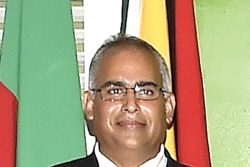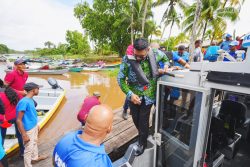One of the consequences of Covid is the widening of the gap between the affluent and the poor, a problem which applies to developed countries as much as developing ones. But nowhere is inequality between the groups more evident than in the area of education. Children from better-off families as well as those whose parents are professionals or semi-professionals will emerge from the pandemic less disadvantaged than those of their peers who do not have this kind of family background. A Dutch study for example found that learning loss during the period of the coronavirus was more than 50% greater for children who had poorly educated parents.
It has long been known that children who had educated parents did better in school than those who did not, it is just that current conditions have exacerbated the situation dramatically. Guyana has had poor educational outcomes which go back for more than a generation, leaving many parents unable to assist their children with schooling. But there are other factors at work too in the case of this country. The Ministry of Education has attempted to make good the loss of formal schooling through use of the internet as well as television and the like. But their efforts are hampered by the absence of an electricity service in many hinterland locations, and even where there is electricity many families do not have access to the internet. Furthermore, it is not at all certain that teachers are stepping into the breach.
Then there is the fact that the income of many parents has declined, sometimes dramatically, even if they have not actually lost their jobs, making it even more of a challenge to provide for their families. Children who are ill fed and/or malnourished will lack the energy and motivation to a greater extent than usual to address themselves to schoolwork which has to be done outside a classroom context.
Minister Nigel Dharamlall spoke about this aspect of the situation last week saying the government would distribute $15,000 for every schoolchild in the next few months, going on to mention that in addition pension and public assistance had also increased this year. As such “a lot of money is being put into building the human social development of people,” he said.
While parents will no doubt be grateful for the $15,000, and in terms of absolute government totals it amounts to no small sum, it will not go very far in relation to what every poor parent needs to support their child, not to mention the fact it is not being paid out immediately but in a few months’ time. Applying for public assistance too is not an easy process, and it is difficult to gauge just how much of an impact such measures will have on children from impoverished families in these economically stressful times. On the topic of schoolwork specifically the Minister did concede that in some cases parents did not understand the curriculum being taught to the students, “So how can they help these children?” he asked.
He was speaking in Black Bush Polder at the time, where clearly there have been issues with teachers not discharging their responsibilities to their charges in the way that is required. He told his audience that the Regional Education Officer had been directed to ensure that arrangements were in place to make sure that students could have access to some sort of interaction with teachers. “We have too many excuses … where teachers, even while sharing worksheets … were leaving the parents to take care of the children, and what we have found is that in many cases parents have to go to work, parents have to secure their own livelihoods.”
He expressed the hope, but not the confidence, that “our teachers are still working with our students,” going on to say that they were supposed to be at work, and if they were still “skylarking” the authorities needed to know, “because we are paying them to be here to give our students proper education.” But then that has always been the problem with so many of the nation’s teachers – although certainly not all – who have become accustomed to augmenting their income with extra lessons, and have fallen into the habit of not delivering in the classroom in order that parents would pay for tuition after school. It would be surprising if this category of educators suddenly developed conscientious habits during a pandemic.
The worksheets to which the Mr Dharamlall referred were one of the modalities by which the Ministry of Education tried to provide extra learning equipment to students, conscious as they were, no doubt, that many parents would not be in a position to assist their children. According to Minister Priya Manickchand they were originally intended for hinterland and riverine students, but the ministry soon discovered they were also required by pupils outside those areas owing to the lack of internet access across the country. She went on to identify other means by which the education authorities had tried to provide alternatives to classroom learning and referred to the use of radio, television and print materials.
The exam schedules have changed this year and some of the assessments have been abandoned altogether, although the National Grade Six Assessment will go forward in early August. Where this is concerned, last month the Minister announced a booster programme for the test which had been devised in conjunction with the Guyana Learning Channel. There would be videos showing classrooms, she said, where locally trained teachers would be teaching. Acknowledging the difficulties of receiving the programmes where there is no access to television or internet, Ms Manickchand said the ministry was working towards having this rectified. “We are in the process right now of purchasing televisions, solar systems and satellite for every single hinterland, riverain community,” she was quoted as saying; “Right now we have nine …” Exactly how far this has proceeded is not clear.
The purpose of the programme was so that Grade Six pupils could be psychologically and mentally prepared for the exam, said the Minister, adding that “We don’t want our Guyanese babies going into a room and feeling so heavily unprepared …” A similar set of aids was being created for students sitting CXC in June-August, although she noted that booster programmes were not a substitute for face-to-face learning.
It was last week, however, that the World Bank approved a US$6.7 million grant from the Global Partnership for Education for the Guyana Sector Programme Project. In a release the Bank said the objective was to improve learning in nursery schools, expand technology use in primary schools and increase the functionality of the education management information system. The bureaucratese of the release notwithstanding, this is nevertheless extremely good news, Mr Ozan Sevimli, the Bank’s Resident Representative for Jamaica and Guyana said, “Guyana’s education sector has made progress in the last 15 years … however the learning outcomes remain low, and improving the quality of education at all levels will be the priority for Guyana to develop its human capital.” The Global Partnership for Education’s CEO Ms Alice Albright for her part said the organisation would continue “to help make Guyana’s education system more resilient and effective so that the most vulnerable girls and boys can go to school and learn.”
Among several other things at the nursery level the project would support teacher training and provide learning materials and importantly, deliver parent education. It might be observed that it is known that in other parts of the world better results are obtained where teachers and parents cooperate. Here the poorest parents tend not to involve themselves in school matters. That aside, it is very encouraging that the project is to begin with nursery schooling, which is recognised as an essential foundation for later learning.
At the primary level, the release said, schools will be equipped with computer tablets to enable them to use technology for foundational skills like mathematics and literacy, as well as smart classrooms to support learning. “As the impact of the pandemic on education is still being felt around the world, GPE’s support to strengthen education in Guyana is more critical than ever,” Ms Albright was quoted as saying. While this is undoubtedly true, there is one thing which her organisation cannot do, and it relates to teachers. The experience of several decades has demonstrated that as fast as the nation upgrades teachers’ skills, they migrate to places where the grass is greener. Countries like Finland, which are high in the world league tables pay their teachers remarkably well. In contrast, as letters to this newspaper this week from Messrs George Cave and E.B. John show, teachers are very poorly paid here. Without the government grasping that particular nettle and making the profession more attractive, it will be difficult to attract quality recruits and arguably impossible to stamp out the pernicious extra lessons syndrome. Committed teachers will make all the difference to the GPE’s education project, and will also help to make good the disadvantage of children with poorly educated parents.






